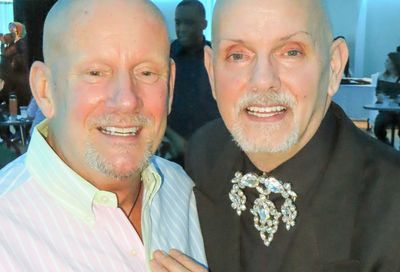DC Public Schools Will Teach LGBTQ History in Social Studies Classes
The D.C. State Board of Education voted unanimously to adopt new “anti-racist” and LGBTQ-inclusive standards for the 2024-2025 school year.

Last month, the D.C. State Board of Education voted unanimously to adopt new “anti-racist” and LGBTQ-inclusive standards for social studies classes that will take effect at the start of the 2024-2025 school year.
The new standards, which were developed by incorporating feedback from community members, D.C. officials, teachers, students, and parents, aim to be “anti-racist,” approaching historical and social movements from multiple perspectives, as opposed to the traditional Eurocentric perspective, and incorporating histories of heretofore underrepresented cultures or identity groups.
The standards also seek to promote civic engagement, with a new “Action Civics” course that has been designed for eighth-grade students; and to improve media literacy, including teaching students how to critique the credibility of sources.
The adoption of the new standards marks the first time that the District’s social studies curriculum has been revised “since 2006 when Bush was president,” Allister Chang, the Ward 2 member on the D.C. State Board of Education, told Metro Weekly in an interview. “Things are quite different and most other jurisdictions update their standards more regularly.”
For example, in neighboring Virginia, course standards must be updated every seven years, but D.C. lacks a similar mandate, meaning that some of the material or topics broached under the traditional curriculum may be outdated or omit large chunks of history — especially figures, movements, or historical occurrences from more recent decades.
To illustrate that point, proponents of the new standards note that the current social studies standards may omit historical occurrences in the late 20th and early 21st centuries, pointing to former President Barack Obama’s election in 2008 or the Supreme Court’s 2015 decision legalizing marriage equality nationwide as examples.
“The majority of schoolchildren in Washington D.C. are Black,” Jessica Sutter, the former president of the D.C. State Board of Education and one of the chief proponents of updating the standards, told DCist/WAMU.
“The nation’s capital, home to President Barack Obama… did not include the existence of him as president,” Sutter said. “That seemed to me deeply problematic on a bunch of levels, but specifically because the children in the city had a president who looked like them.”
Under the new curriculum, teachers will be required to teach about some LGBTQ historical figures, movements, or events.
Among the list of topics that will be incorporated into certain grade-level standards are: D.C.’s Black Renaissance; the “Lavender Scare” of the 1950s, in which the U.S. government sought to excise all known gays and lesbians from the federal workforce; the life and accomplishments of gay activist and politician Harvey Milk; and the Supreme Court’s pro-marriage equality ruling in Obergefell v. Hodges.
The standards also change how certain events or figures are referred to in class. For example, Christopher Columbus will be discussed as a “colonizer” rather than a mere “explorer” — a critique of the way that traditional history courses have downplayed Columbus’s role in prompting European powers to colonize and fight — both against indigenous Americans and against each other — over land and resources.
Additionally, according to The Washington Post, schoolchildren will begin learning about the characteristics and contributions of indigenous civilizations, including the Aztecs, Maya, and Inca, beginning in first grade, and will examine colonization from the perspective of indigenous people in older grades.
In another example, fifth-grade students adhering to the new standards will explore the rise of white supremacist groups within the context of Reconstruction and the adoption of the 13th, 14th, and 15th amendments to the U.S. Constitution in the late 19th century. The topic will again be defined and revisited in the seventh grade within the context of important milestones in U.S. history.
The new standards will also stress the importance of learning about the histories of heretofore underrepresented minority groups, such as Asian Americans and indigenous people, and their impact on national and D.C. history.
“We should not only be preparing our students to understand who they are within our own contexts, but also how to understand people who behave differently and experience the world differently,”Chang told Metro Weekly.
The new social studies standards have been endorsed by the National Council for the Social Studies and “professors from various institutions, including Howard University, the University of Maryland, and New York University,” according to DCist.
“We’re getting a lot of positive reinforcement around changes that are more reflective of who our communities are actually made of and the responsibility of our systems to make sure that we’re preparing all students to learn how to navigate both diversity locally and internationally,” Chang said.
He gave the example of a 10th grade social studies teacher coming to a forum and “giving very, very specific feedback on a very, very specific line of how she thinks [the standards] should be in different ways so that she can incorporate it better for her classroom.”
Educators will have the option to attend a “Summer Social Studies Resource Institute,” hosted by the Office of the State Superintendent of Education, in July 2024. The training program will assist them in finding materials and developing assessments that address the new standards, Chang added, noting that OSSE has allocated $500,000 in funding to support this endeavor.
“We want to make sure that the city is providing individual schools and teachers with support,” he said.
The D.C. State Board of Education’s move to adopt the new standards comes at a time when numerous school districts throughout the country are fighting over curriculum content and classroom materials. Right-leaning individuals accuse schools and teachers of seeking to “indoctrinate” students into leftist ideology or “woke” concepts by pushing a liberal-leaning curriculum, while left-leaning individuals have accused conservative-leaning states and school boards of seeking to “whitewash” history by eliminating or avoiding topics that don’t conform to their worldview.
Additionally, some states have sought to erase LGBTQ visibility or avoid LGBTQ-inclusive lessons by passing restrictions on classroom content similar to Florida’s “Don’t Say Gay” law, or pushing for book bans — based on fears that exposure or mere proximity to LGBTQ-related topics will influence children to identify as LGBTQ.
In nearby Virginia, parents, educators, and community members clashed with the Republican-appointed Virginia Board of Education after it proposed updated social studies and history standards that critics have claimed is “whitewashed” and politically-motivated. In neighboring Montgomery County, where Democrats are the dominant political party, conservative parents protested after school officials declared that Maryland state law does not permit parents to “opt” their children out of all LGBTQ-related lessons or content, as reported by the Post.
Eric Goulet, the Ward 3 member of the D.C. State Board of Education, defended the new standards as a counter to efforts to censor historical information occurring in other states.
“Were seeing states across this country deliberately go backwards,” Eric Goulet, Ward 3 Representative, told DCist. “We’re right now putting forward something that makes the statement that we want our students here in D.C. to be informed, to be critical thinkers, to be good citizens.”
The vote to approve the new standards comes on the heels of D.C. establishing universal standards for classes on menstruation which requires all students, regardless of gender expression, to learn about menstruation. In the coming years, the D.C. State Board of Education is expected to next implement financial literacy and environmental literacy standards.
The new social study standards will go into effect in the 2024-2025 school year and will be fully implemented by the 2025-2026 school year in all D.C. public and charter schools.
Support Metro Weekly’s Journalism
These are challenging times for news organizations. And yet it’s crucial we stay active and provide vital resources and information to both our local readers and the world. So won’t you please take a moment and consider supporting Metro Weekly with a membership? For as little as $5 a month, you can help ensure Metro Weekly magazine and MetroWeekly.com remain free, viable resources as we provide the best, most diverse, culturally-resonant LGBTQ coverage in both the D.C. region and around the world. Memberships come with exclusive perks and discounts, your own personal digital delivery of each week’s magazine (and an archive), access to our Member's Lounge when it launches this fall, and exclusive members-only items like Metro Weekly Membership Mugs and Tote Bags! Check out all our membership levels here and please join us today!






















You must be logged in to post a comment.